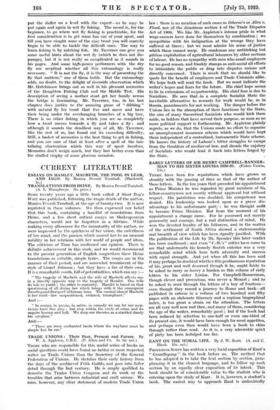TRADE UNIONS : Their Past, Present and Future. By W.
A. Appleton, C.B.E. (P. Allan and Co. 3s. 6d. net.) THOSE who are responsible for this useful series of books on social questions could have found no better or more respected Writer on Trade Unions than the Secretary of the General.
Federation of Unions. He sketches their early history from the days of the mediaeval Frith Guilds, and goes into fuller
detail through the last century. He is amply qualified to describe the Trades Union Congress and its work or the troubles that arise between industrial and craft unions. We miss, however, any clear statement of modem Thick' Union law : there is no mention of such cases as Osborne's or Allen v.
Flood, nor of the disastrous section 4 of the Trade Disputes Act of 1906. We like Mr. Appleton's intense pride in what wage-earners have done for themselves by combination ; we sympathize with his indignation at the wrongs they have suffered at times ; but we most admire his sense of justice which those cannot warp. He condemns any unthinking but pitiless exploitation of agricultural labourers by other sections of labour. He has no sympathy with men who assail employers for no good reason, and frankly stamps as anti-social all efforts to intimidate the public or drag into disputes unions not directly concerned. There is much that we should like to
quote for the benefit of employers and Trade Unionists alike. We hope, both will read the book. But we must indicate the
writer's hopes and fears for the future. His chief hope seems to lie in extensions of co-partnership. His chief fear is due to Socialism. He sees that .in a complete Socialist State the inevitable alternative to rewards for work would be, as in Russia, punishments for not working. The danger before the Unions lies in the absorption of their functions by the State, the aim of many theoretical Socialists who would kick them -aside, as ladders that have served their purpose, so soon as no more political support is forthcoming. Mr. Appleton plainly -regrets, as we do, that the Unions made no effort to organize an unemployment insurance scheme which would have kept them independent of a centralized, bureaucratic State scheme. He knows the history of Labour's bitter struggles to escape from the thraldom of mediaeval law, and dreads the cajolery of Socialists who would lead it back into fetters forged by the State.


























































 Previous page
Previous page